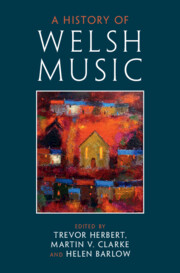Book contents
- A History of Welsh Music
- A History of Welsh Music
- Copyright page
- Contents
- Figures
- Maps
- Music Examples
- Contributors
- Preface
- Acknowledgements
- Glossary
- Maps
- Chapter 1 Music in Welsh History
- Chapter 2 Words for Music
- Chapter 3 Music in Worship before 1650
- Chapter 4 Secular Music before 1650
- Chapter 5 The Eisteddfod Tradition
- Chapter 6 Women and Welsh Folk Song
- Chapter 7 Instrumental Traditions after 1650
- Chapter 8 The Celtic Revival
- Chapter 9 Musical Communications in the Long Nineteenth Century
- Chapter 10 Nonconformists and Their Music
- Chapter 11 Professionalisation in the Twentieth Century
- Chapter 12 Composing Cymru
- Chapter 13 Traditions and Interventions
- Chapter 14 New Traditions
- Chapter 15 Singing Welshness
- Chapter 16 Postscript
- Book part
- Bibliography
- Index
Chapter 14 - New Traditions
Welsh Popular Music into the Twenty-First Century
Published online by Cambridge University Press: 08 September 2022
- A History of Welsh Music
- A History of Welsh Music
- Copyright page
- Contents
- Figures
- Maps
- Music Examples
- Contributors
- Preface
- Acknowledgements
- Glossary
- Maps
- Chapter 1 Music in Welsh History
- Chapter 2 Words for Music
- Chapter 3 Music in Worship before 1650
- Chapter 4 Secular Music before 1650
- Chapter 5 The Eisteddfod Tradition
- Chapter 6 Women and Welsh Folk Song
- Chapter 7 Instrumental Traditions after 1650
- Chapter 8 The Celtic Revival
- Chapter 9 Musical Communications in the Long Nineteenth Century
- Chapter 10 Nonconformists and Their Music
- Chapter 11 Professionalisation in the Twentieth Century
- Chapter 12 Composing Cymru
- Chapter 13 Traditions and Interventions
- Chapter 14 New Traditions
- Chapter 15 Singing Welshness
- Chapter 16 Postscript
- Book part
- Bibliography
- Index
Summary
Like most countries around the world, Wales saw a flowering of popular music in the 1960s. Following the ubiquitous contemporary Anglo-American model, the popular music that emerged in Wales during that decade signalled a number of cultural shifts, both musical and linguistic. This chapter surveys the roots and developments of Anglophone and Welsh-language popular musics from the 1960s into the twenty-first century, focusing on shared traditions, political engagement, the attitudes of the ‘official’ institutions of both Welsh- and English-language culture (including the eisteddfod, the chapel and the media), and the impact of Welsh devolution; and revealing Wales’s contributions to fifty years of global musical dialogue. It considers the careers of several Welsh stars who ‘crossed over’ into the Anglo-American mainstream, including Shirley Bassey and Tom Jones, and the rise of the bands of the so-called ‘Cool Cymru’ era - prominent among them Catatonia, Super Furry Animals, Manic Street Preachers and Stereophonics. These bands achieved a new level of sophistication and cultural importance for Welsh pop, the clearest signal of which was the release of Super Furry Animals’ internationally acclaimed album Mwng (2000), a collection of songs sung entirely in the Welsh language. Post-devolution Wales has offered a greatly enriched cultural environment and infrastructure for pop music that has ensured the mainstream success of a new generation of Welsh artists such as Gwenno.
Keywords
- Type
- Chapter
- Information
- A History of Welsh Music , pp. 315 - 331Publisher: Cambridge University PressPrint publication year: 2022



